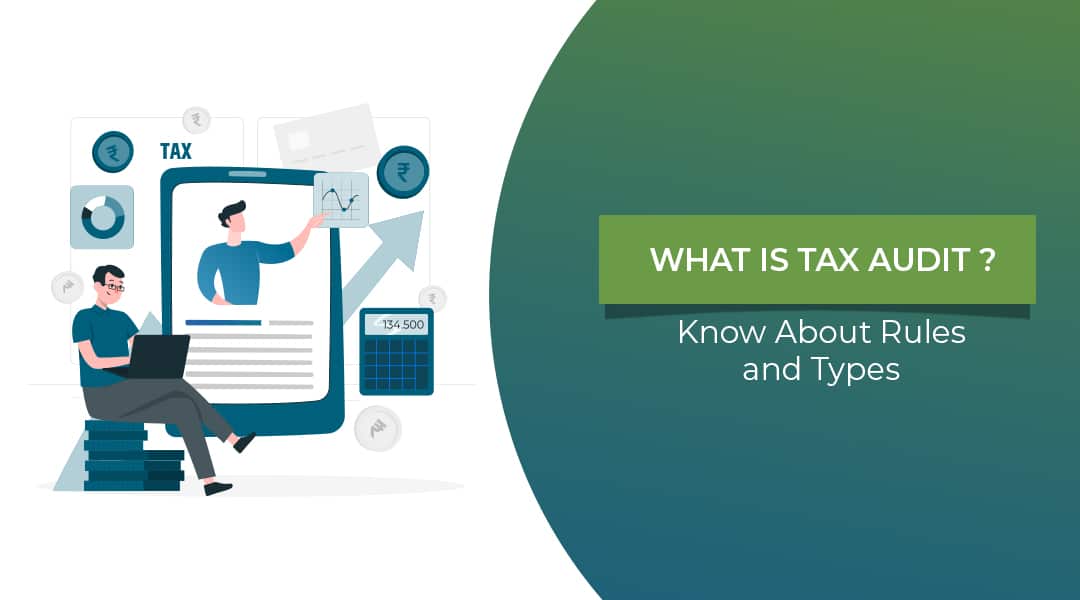What is Tax Audit – Know About Rules and Types
To define what a tax audit is, it is important first to understand what an ‘Audit’ means. As far as the dictionary is concerned, an audit means a formal inspection of an organization’s accounts, followed by the preparation of a report by a third party. It can also be defined as a systematic assessment of something or the process of going over or reviewing something. In this article, we will give complete information about tax audits and the concept of tax audits with special reference to India.
What is Tax Audit?
A tax audit can be defined as a process of reviewing a taxpayer’s records with a view to ascertaining whether the accounts have been presented in the right manner with respect to the existing laws of taxation. In India, Tax Audits are mostly regulated by the Income Tax Act of 1961 India, where specific categories of taxpayers are supposed to get their accounts audited. The primary aim of conducting a tax filing service is to verify that the taxpayer’s accounts present a real and accurate picture of the taxpayer’s income and to determine whether the taxes have been paid in full.
Audits play an important role in the tax compliance mechanism. They act as a control measure against fraudulent activities, tax evasion and under declaration of income. This way, through proper compliance to the requirements provided by the tax authorities, tax audits foster the credibility of the tax system.
What are the Objectives of a Tax Audit?
- Accuracy and Compliance: To confirm that the taxpayer has stated his or her income, deductions, and the required amount of tax correctly.
- Detection of Fraud and Evasion: For purposes of eliminating fraudulent activities as well as evasion of taxes as well as under declaration of income.
- Verification of Compliance: To ensure that the taxpayer is in compliance with all the laws and regulations regarding tax issues.
- Facilitation of Tax Administration: This is done to help the tax authorities avoid possible disputes in the assessment of taxes and to make this process as comfortable as possible.
- Transparency and Accountability: For accuracy of the financial statements in order to enhance the accountability of the taxpayers.
Turnover Limit for Income Tax Audit
Every taxpayer is subject to tax audit if sales, turnover, or gross receipts of business during a year exceeds ₹ 1 crore or if the gross receipts of professionals during the financial year exceeds ₹ 50 lakh. Further, there are other sundry circumstances wherein an audit may be mandatory. These situations are detailed below.
Amendments to this provision:
Finance Act 2021: Finance Act 2021 made a change to the threshold limit for tax audit concerning any registered dealer implementation from April 1, 2021, to ₹ 10 crores with the condition that through cash, 5% should not exceed the total transaction.
- For Businesses: For a mandatory tax audit, a limit of ₹ 1 crore of turnover has been set. But if a business chooses presumptive taxation under section 44AD of Income Tax Act and declares income below the said limit, the said limit is ₹2 crores.
- For Professionals: The threshold for professionals is ₹ 50 lakhs. In circumstances where the gross receipts are more than this amount, tax audit is necessary.
Thus, these limits may fluctuate depending on the changes in the tax legislation, so it is crucial for individuals and companies to abide by the current laws.
Why is a Tax Audit Conducted?
Its primary role is to ensure compliance with the law since your business is established under the provisions of the Income Tax Act of India. When the taxation service process is completed, you are put in an easier place to complete your tax returns. A tax audit helps to detect any mistakes and omissions on your part at an early stage by scrutinizing your books of accounts and checking that you are reporting the things you are required to. Also, once you undergo a tax audit, it becomes very easy for the tax authorities to scrutinize your income Tax returns.
Who Conducts Tax Audits?
Tax audit is conducted by a chartered accountant (CA) or any CA firm. However, each CA can perform a maximum of 60 audits only. As for the firms, each of them has its limit of tax audit for each partner.
What are The Types of Tax Audits in India
- Field Audit: This audit is conducted at your business premises. In this case, all important documents at the site will need to be provided so as to enhance auditing.
- Office Audit: This audit is done at the tax authority’s office. All identity-related papers should be available to the candidate at the time of the spell on the show. Occasionally, you will be given a letter indicating the papers you have to produce.
- Correspondence Audit: In this kind of audit, a letter containing the documentation required for the audit will be issued to you. In the mentioned correspondence, you are expected to forward the required documents only through mail.
How do you do a tax audit in India?
In India, the tax audit process involves filing only certain forms. Here are the four most commonly used:
- Form 3CA: Aside from that, it is utilized by companies or professionals who need to go through a mandatory tax audit.
- Form 3CB: Applicable only to that business or profession that does not come under the requirement of getting a tax audit done.
- Form 3CD: This form is useful in providing a comprehensive business report and the company’s fiscal activities.
- Form 3CE: This form is applicable if the NRI’s or any foreign company receives fees or royalties from any Indian company or the Indian Government for technical services provided.
The Institute of Chartered Accountants of India (ICAI) periodically posts updates and information on tax audits and changes to them. For instance, changes on Form 3CD were made late in 2018 in a bid to incorporate these alterations.
Income Tax Audit Due Date
The tax audit due date for AY 2023 24 is 30th September 2024. However, the CBDT can only extend this date in some circumstances. Citizens should make sure that they file the tax audit report before the datelines expire to avoid penalties as we stay compliant.
Penalty of Non-filing or Delay in Filing Tax Audit Report
The case of failing to file the tax audit report within the stipulated time frame attracts serious penalties under the provisions of the Income Tax Act, especially Section 271B. The penalty is:
- 0. 5% of Total Sales/Turnover/Gross Receipts: Depending on the type of accident, the claim could be up to ₹ 1. 5 lakhs.
However, the penalty may be waived where the taxpayer has a reasonable cause for the delay or non-filing of a tax return.
GGC’s Virtual Finance Services For All Your Financial Needs
We understand that dealing with tax authorities can be challenging, especially for those unfamiliar with the process. Providing too much information during an audit can unintentionally lead to complications. That’s why it’s crucial to have professional guidance. Our team of experts can assist in managing the audit process by providing only the necessary information in a well-organized manner, reducing the risk of unnecessary exposure to scrutiny. Our expert CAs with 10+ years of experience provide tax filing services:
- Give you an overview of the tax concept.
- File your audit report.
- A detailed analysis of your business.
- Help with every financial obstacle of your business.
Trust us to handle your tax audits efficiently and professionally so you can focus on growing your business.
FAQs
What is an Income tax Audit under Section 44AB?
Section 44AB Income tax audit refers to a procedure that is carried out by a chartered accountant whereby the accounts and other documents of the assessee are scrutinized and checked out. This audit is for those entities who deal in business or profession having gross receipts exceeding ₹1 crore for business and ₹50 lakhs for profession. The main aim is to verify the financial statements and, most importantly, confirm tax compliance on the incomes so as to attach a tax audit report to the Income Tax Return.
Who is required to undergo a tax audit?
Businesses and professionals whose turnover or gross receipts exceed the prescribed threshold under the Income Tax Act are required to undergo a tax audit.
What happens if I miss the tax audit deadline?
Missing the tax audit deadline can result in penalties under Section 271B of the Income Tax Act, amounting to 0.5% of your turnover, up to a maximum of ₹1.5 lakhs.
What documents are audited under Section 44AB?
The CA audits the books of accounts like the cash book, ledger, journals, bank statements, stock records, and sales/purchase invoices. Authenticates the state of affairs of business as on the last date of the financial year.
My business turnover is ₹90 Lakh. Do I need to get an Audit?
No, you are not required to undergo a tax audit if your business’s annual turnover is ₹90 lakh.
Is it possible to revise the Tax Audit Report?
Yes, a tax audit report can be revised under special circumstances whereby, the changes that are attributable to tax laws or their interpretations, the issue with the software or if there were some mathematical mistakes that could have been spotted after the adoption of the financial statements in the AGM among others.



